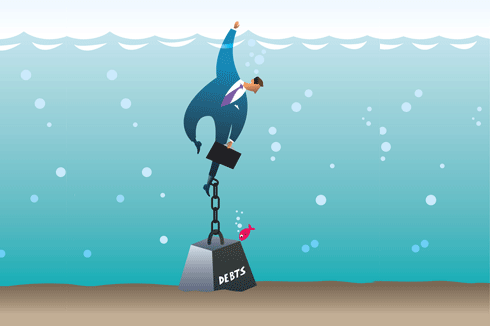 Nobody likes to pay extra fees and, unfortunately, a lot of people fall victim to hidden fees when they first open an account. This can be avoided by reading all of the fine print, but it’s best to start with a bank that has no fees or minimal fees. Whether you’ve just gotten your first checking account or just setup a new bank account for a job that you just landed, you’re bound to run into some fees. This can come as a surprise to a lot a people and often times it leaves them financially crippled.
Nobody likes to pay extra fees and, unfortunately, a lot of people fall victim to hidden fees when they first open an account. This can be avoided by reading all of the fine print, but it’s best to start with a bank that has no fees or minimal fees. Whether you’ve just gotten your first checking account or just setup a new bank account for a job that you just landed, you’re bound to run into some fees. This can come as a surprise to a lot a people and often times it leaves them financially crippled.
It’s understandable that banks have to charge fees, they do offer quite a bit of services that can take up resources, and you’ve got to admit that a lot of banking features can come in handy. The ability to pay bills online, manage your accounts and transfer funds can be very helpful to a lot of people. Even so, a lot of the fees seem to be a bit pricey. The increase in fees has drastically increased within the past couple of decades, and it really makes you wonder how they’re determining the costs. It’s really no fun to check your bank statement and see a bill of $200 just for doing your normal banking routine.
The best way to avoid this is by finding a financial institution that has no or minimal fees. If you’re the type of person who just uses a bank to cash your paycheck, you can avoid a lot of fees by just getting a basic account. A good portion of banking fees come from accounts that have various bells and whistles. If you’re only going to be taking out money once a week, or even just making debit transactions, you should choose a banking account with basic features.
Now, I realize that nobody likes to read a wall of text about a bank’s fees or service agreements, but it can save you from many headaches. Looking through the fine print will allow you to be familiar with all of the types of fees and how to avoid them. If you feel that the terms and conditions print is too complicated, you should give your financial institution a call and have a representative thoroughly explain all of the fees to you. If you’re still unsure which type of account you should choose, tell the representative what kind of features you’ll be using and ask them to find an account type that suits you.
You can also find a lot of lower cost banks by researching online. A simple Google search of a bank’s name along with the word “review” will yield pages and pages of information. Read through some opinion and base your decisions off of what other users have to say. You’ve got a lot of options, so there’s no need to go with the first bank you come across.
Larry Gray has worked with Cyprus offshore banking for 10 years and is educated in various financial aspects.
 You need to start planning now if you want to have some money set aside for next year’s vacation. But how can you go about doing this without succumbing irrelevant purchases and overspending on lavish dinners? For some families, saving up money for a year-end vacation is a breeze. For others, it can be quite a challenge. In the following sections, we’ll provide you with a few key tips for helping you save money for your own year-end vacation.
You need to start planning now if you want to have some money set aside for next year’s vacation. But how can you go about doing this without succumbing irrelevant purchases and overspending on lavish dinners? For some families, saving up money for a year-end vacation is a breeze. For others, it can be quite a challenge. In the following sections, we’ll provide you with a few key tips for helping you save money for your own year-end vacation.
Set Your Sights on Your Destination
First and foremost, you have to stay committed to whatever saving process you decide to take. If you can’t then chances are good that you’re going to overspend in areas where you shouldn’t. One of the best ways to stay persistent is to remind yourself why you are saving. Post pictures of your travel destination on your computer desktop and talk about your plans with co-workers and friends. This will ultimately increase your motivation and help you stay focused when saving money.
Use Your Miles
If you are someone who travels a lot then you can use your miles to earn a free flight at the end of the year. Keep in mind that the amount of miles that you’ll need ranges from carrier to carrier and it also depends on where you are traveling to. In general, you can acquire free flights by accumulating anywhere between 10,000 and 30,000 miles. This can be a quick and simple step to take when you are trying to save money on a year-end vacation.
Start a “Travel Fund”
Not only is starting a “travel fund” a lot of fun but it can ultimately allow you to save up a lot of money in a relatively short amount of time. Take note that there are a few golden rules that you’ll want to follow when taking this route. The first is that you shouldn’t remove money from this fund unless it is an absolute emergency.
One tip that you could utilize is putting your money in a separate bank account where you won’t be able to see it on a daily basis. Secondly, try to put at least 10% of your monthly income into your travel fund. While it may not seem like a lot at first, this number can quickly add up and provide you with a hefty fund to utilize at the end of the year for your travels.
Noc likes to travel and start saving at the beginning of the year for a big trip and sometime uses Travel Advantage Network to create lifelong memories.
Tags: budgeting, cash, financial planning, money, personal finance, savings, travel, vacation
 Budgeting, Financial Planning, Money, Personal Finance, Savings
Budgeting, Financial Planning, Money, Personal Finance, Savings
 Buying a property is a huge decision. Whether it’s a matter of finding a solid place for investment or simply looking for that dream house to turn into a home, chances are that buying in bricks and mortar will be one of the most important financial decisions of your life. No pressure.
Buying a property is a huge decision. Whether it’s a matter of finding a solid place for investment or simply looking for that dream house to turn into a home, chances are that buying in bricks and mortar will be one of the most important financial decisions of your life. No pressure.
To help, here are five things that you might want to consider before you sign your life away.
1) Planning ahead
Walk through the house and try and imagine yourself, or your family, or potential tenants, living there. Does the floor plan work? Are master bedrooms within easy reach of kids’ bedrooms, or will toddlers have to navigate a set of stairs to find their parents in the night? Will entertaining be a seamless task, or do guests have to pass through the laundry to get to the deck? A little bit of imagination will help you discern whether a real person or family (not just the hypothetical one the architect had in mind) could live there.
2) Security is key
You’re either going to be living in this property yourself, or charging a fee to give someone else the privilege; security is a must. If it’s an apartment, ask about security in the lobby; is there staff you can contact overnight? Have there been any robberies in the building? Freestanding houses bring their own set of issues. Side lanes can make it easy for an intruder to enter through to the backyard. Ask the real estate agent these questions.
3) Inspect the aspect
‘Aspect’ is basically just realtor jargon for ‘the way that this building faces.’ No, nobody really understands why they call it that. In cities like Sydney, a house with a north/north-easterly aspect will be cool in summer and warm in winter.
4) Money doesn’t grow on trees
Sometimes price is the factor that makes you keep your mouth shut during an auction. If you want to know whether stretching yourself a little financially is worth it, look at growth trends for the suburb. Is this suburb just coming into its prime? Or is it really yesterday’s news? If the suburb you’re buying in has slowing growth, but one’s around it seem to be just picking up, why not broaden your search? Better to pick a fruit just before it turns ripe than after it’s started to go brown.
5) Very superstitious…
Finally, particularly for potential landlords, you should think about any superstitions that could be surrounding the property. But this means more than just sussing out whether or not it is a deceased estate. For example, it is a common belief within Chinese culture that the number 4 is unlucky, so that could be a deterrent for potential tenants. Luckily, this is something that can easily be averted; have you ever wondered why so many apartment blocks go straight from 2A to 6?
Tags: economy, financial planning, money, mortgage, property, real estate
 Budgeting, Loan, Money, Mortgage, Property, Real Estate
Budgeting, Loan, Money, Mortgage, Property, Real Estate
 Do you feel like your drowning in debt? If you answered yes, one of the most effective ways to get to the root of the problem is seek the guidance of a debt counselor. It is very difficult to look at your spending with an open mind when you are trying to take control of the spending and the debt without an unbiased professional’s help. The first step identifying where the problem lies is to schedule a debt consultation. During your appointment, an experienced debt counselor will help you come up with a plan to tackle your debt, but you must be prepared if you want the appointment to go right.
Do you feel like your drowning in debt? If you answered yes, one of the most effective ways to get to the root of the problem is seek the guidance of a debt counselor. It is very difficult to look at your spending with an open mind when you are trying to take control of the spending and the debt without an unbiased professional’s help. The first step identifying where the problem lies is to schedule a debt consultation. During your appointment, an experienced debt counselor will help you come up with a plan to tackle your debt, but you must be prepared if you want the appointment to go right.
How to Prepare for Your Upcoming Debt Consultation
When you are being counseled about your debt, the counselor will give you personalized advice that is tailored to help guide you out of your current situation. To give you advice, the counselor needs to know exactly how much pay you take home, how much all of your living expenses cost, and how much you owe all of your creditors. Only you know who you owe money to and how serious your situation has become. While it is only natural to try and downplay the situation in your own mind, you should never try and downplay your debt to your counselor. Here are some things you can do to prepare for your consultation so that you have everything you need to come up with a feasible debt reduction plan:
- Do not accept any new credit card offers or loans. The key is to stop digging yourself into debt, and taking out new lines of credit will not help the situation.
- Gather documentation that the counselor will need to review your current situation. These documents may include: billing statements, past due invoices, recent receipts, judgments, all letters from your creditors, titles to your cars, property deeds, and credit card statements. If you do not have any of these on hand, access your accounts online and print the account summary page.
- If you love to make work easier for everyone involved, make a list of all of the credit cards you have. In the spreadsheet, you can put the current account balance and credit limit. This will help your counselor see which cards need to be tackled first to repair your credit.
- Bring pay stubs from the last two pay periods. If your income varies, try bringing at least three months worth of cancelled checks. This will help the counselor assess how much you are taking home and what percentage of your income can be used to payoff debt.
Debt counselors can help you choose the best debt relief option for your situation. What is right for one person may not be right for the next. Bring everything that you need to help your counselor assess your situation. With all of the right documentation and the right mindset, you can pay your debt down and put your mind at ease.
This post was provided by Heather Graham, a personal finance expert. He recommends the consumers proposal process for those facing dept problems. André Gabbay et Associés Inc. can help with debt consulations.
Tags: debt, debt advice, debt consolidation, debt consultation, debt help, debt management, debt relief, finance, financial planning, personal finance
 Budgeting, Credits, Debts, Financial Planning, Money, Personal Finance
Budgeting, Credits, Debts, Financial Planning, Money, Personal Finance
 Aside from the obvious benefit of a reduced sentence, there are a number of benefits to accepting a plea bargain. Plea bargains often pose advantages to both sides, both the defense and prosecution. Time, money, and hassle are saved for both sides of the legal process. There are also several benefits the defendant should keep in mind when considering a plea bargain.
Aside from the obvious benefit of a reduced sentence, there are a number of benefits to accepting a plea bargain. Plea bargains often pose advantages to both sides, both the defense and prosecution. Time, money, and hassle are saved for both sides of the legal process. There are also several benefits the defendant should keep in mind when considering a plea bargain.
Faster Outcome
A criminal trial can be a long, expensive, and emotionally traumatic experience for a defendant. Plea bargains allow you to skip the extensive trial procedure and move right into the sentencing phase before a judge. You will know the outcome of the conviction much sooner than if you had to go through an entire trial, without needing to pay attorneys’ bills throughout the trial process.
Leave Jail
Defendants unable to get out on bail, whether bail was denied or is too expensive, will most likely need to stay in jail for the duration of the trial before being released or transferred to a prison. Once a plea is entered and accepted, you will be sentenced and moved out of the jail. Leaving jail could mean going home or starting a sentence in a prison. While prison may not seem like a good place to be, they are almost always better than jail.
Lesser Charges
A plea bargain often involves pleading guilty to offenses less serious than those you were charged with initially. The prosecution will reduce the charges, or remove some altogether, as a way of making the plea agreement more attractive to the defendant and increasing the chances of a fast conviction.
This is an especially important benefit of accepting a plea bargain if you are being charged with crimes that can be personally, socially, or professionally damaging. A lesser related offense can keep you from needing to continue feeling the negative effects of a conviction even after you have paid your debt to society.
Shorter Sentence
A plea bargain that results in you entering a guilty plea to lesser charges can also result in a shorter sentence. Not only are the required minimum sentences shorter for less serious crimes, many judges are more likely to show leniency to a defendant willing to accept responsibility and avoid a lengthy trial. A plea bargain can help you reduce the time you will need to serve.
The benefits of accepting a plea bargain affect your life in both the short and long terms. By accepting a plea bargain you can avoid the embarrassment of a trial and potentially shorter the sentence you will receive. Always consult with a lawyer before accepting a plea agreement.
Mike often writes articles to help explain the confusing criminal justice system. While he tries his best to explain the laws, he believes that hiring a criminal defense attorney is still the best way to go if in legal trouble.
Tags: attorney, bargain, economy, law, legal, money, savings, tips
 Budgeting, Business, Financial Planning, Forex, Investment, Law, Money, Personal Finance, Trading
Budgeting, Business, Financial Planning, Forex, Investment, Law, Money, Personal Finance, Trading
 Nobody likes to pay extra fees and, unfortunately, a lot of people fall victim to hidden fees when they first open an account. This can be avoided by reading all of the fine print, but it’s best to start with a bank that has no fees or minimal fees. Whether you’ve just gotten your first checking account or just setup a new bank account for a job that you just landed, you’re bound to run into some fees. This can come as a surprise to a lot a people and often times it leaves them financially crippled.
Nobody likes to pay extra fees and, unfortunately, a lot of people fall victim to hidden fees when they first open an account. This can be avoided by reading all of the fine print, but it’s best to start with a bank that has no fees or minimal fees. Whether you’ve just gotten your first checking account or just setup a new bank account for a job that you just landed, you’re bound to run into some fees. This can come as a surprise to a lot a people and often times it leaves them financially crippled.















